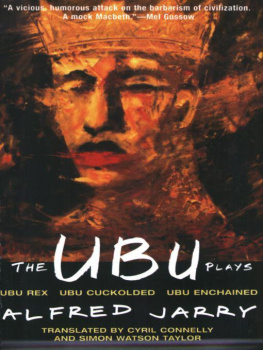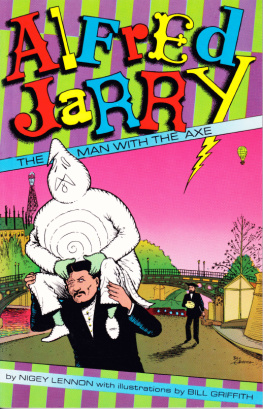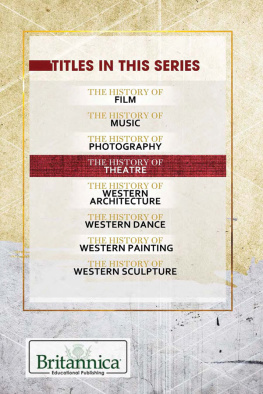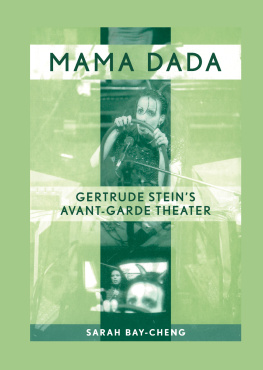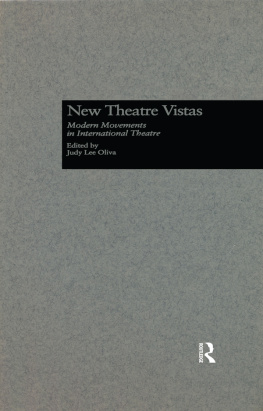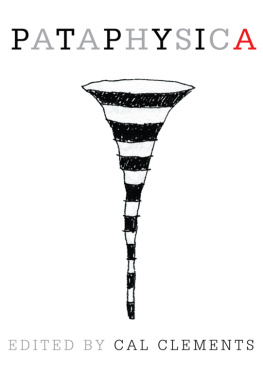Table of Contents

Ubu Rex: this translation copyright 1968 by Cyril Connolly and Simon Watson Taylor
Ubu Cuckolded (Ubu Cocu): this translation copyright 1965 by Cyril Connolly
Ubu Enchained: this translation copyright 1968 by Simon Watson Taylor
Introduction copyright 1968 by Simon Watson Taylor
All rights reserved. No part of this book may be reproduced in any form or by any electronic or mechanical means, or the facilitation thereof, including information storage and retrieval systems, without permission in writing from the publisher, except by a reviewer, who may quote brief passages in a review. Any members of educational institutions wishing to photocopy part or all of the work for classroom use, or publishers who would like to obtain permission to include the work in an anthology, should send their inquiries to Grove/Atlantic, Inc., 841 Broadway, New York, NY 10003.
CAUTION: Professionals and amateurs are hereby warned that Ubu Rex, Ubu Cuckoled, and Ubu Enchained are subject to a royalty. They are fully protected under the copyright laws of the United States, Canada, United Kingdom, and all British Commonwealth countries, and all countries covered by the International Copyright Union, the Pan-American Copyright Convention, and the Universal Copyright Convention. All rights, including professional, amateur, motion picture, recitation, public reading, radio broadcasting, television, video or sound taping, all other forms of mechanical or electronic reproduction, such as information storage and retrieval systems and photocopying, and rights of translation into foreign languages, are strictly reserved.
All rights whatsoever in these translations are strictly reserved, and applications for performance, etc., by professional and amateur companies in all parts of the world, except the United States of America and Canada, should be made to Rogers, Coleridge and White Ltd., 20 Powis Mew, London W 11 IJN. In the United States and Canada application should be made to Dramatists Play Service Inc., 440 Park Avenue S., New York, NY 10016. No performance may be given unless a license has been obtained.
Published simultaneously in Canada
Printed in the United States of America
Library of Congress Catalog Card Number 69-19439
ISBN-10: 978-0-802-19905-8 ISBN-13: 978-0-8021-5010-3
Grove Press
an imprint of Grove/Atlantic, Inc.
841 Broadway
New York, NY 10003
Distributed by Publishers Group West
www.groveatlantic.com
08 09 10 11 12 13 25 24 23 22 21
Alfred Henri Jarry



Works by Alfred Jarry published after his death include:


Translations into English:

Critical and biographical writings on Jarry in English include:
Maurice Labelle, Alfred Jarry, Nihilism and the Theatre of the Absurd (1980)
Claude Schumacher, Alfred Jarry and Guillaume Apollinaire (1984)
Keith Beaumont, Alfred Jarry, A Critical and Biographic Study (1984)
Keith Beaumont, Alfred Jarry, Ubu Roi (1987)
Critical and biographical writings on Jarry in French include:
Noel Arnaud, Alfred Jarry, dUbu Roi au Docteur Faustroll (1974)
Franois Caradec, A la recherche dAlfred Jarry (1974)
Henri Bhar, Jarry dramaturge (1980)
Henri Bordillon, editor, Alfred Jarry, Colloque de Cerisy (1981)
Henri Bhar, Les Cultures de Jarry (1988)
Patrick Besnier, Alfred Jarry (1990)
Introduction
Le Pre Ubu was born in 1888, the year that Alfred Jarry entered the Rennes lyce at the age of fifteen, and became friendly with a fellow-pupil, Henri Morin, who had been indulging in the popular classroom sport of baiting the unfortunate physics teacher, Monsieur Hbert (known to his pupils variously as P.H., Pre Heb, Eb, etc.). Henri had written, together with his elder brother Charles, a short satire, Les Polonais, in which le Pre Eb suffered unspeakable indignities as king of an imaginary Poland. Jarry converted this sketch into a playlet for marionettes, which was performed first at the home of the Morins and later at the home of the Jarrys. While at the Rennes lyce, Jarry developed the same promising theme in a pice alquemique, Onsime ou les Tribulations de Priou, featuring le P. H. and la Mre E. B..
After leaving Rennes for Paris in 1891 to attend the Lyce Henri IV, he rewrote both Les Polonais which he had inherited from the Morin brothers, and his own Onsime (in which the younger Morin may have collaborated), and the resulting plays, the first drafts of Ubu Roi and Ubu Cocu respectively, were performed by Jarry and a circle of school-friends (including Lon-Paul Fargue) at his lodgings in an alleyway off the Boulevard du Port-Royal. It was only now that le P. H. assumed his definitive identity as le Pre Ubu.
In April 1893, Jarry saw his writing in print for the first time with the publication of three prose texts (two of them fragments from this proto-Ubu Cocu)in a literary review: from this moment, any thought of continuing his studies at the Ecole Normale Suprieure vanished, and he plunged into the world of letters. The publication in October 1894 of his first book, the ultra-symbolist Minutes de Sable Mmorial, by the Editions du Mercure de France, whose publisher, Alfred Vallette, and his wife the novelist Rachilde, were to remain his lifelong friends and loyal rescuers in time of need, was followed by an abbreviated period of military service, and the publication in October 1895 of his second book, Csar-Antlehrist.
In January 1896, Jarry was introduced to Lugn-Poe, the director of the Thtre de luvre, and proposed to him the production of either Ubu Roi (in a revised version) or Les Polydres (his original title for the first version of Ubu Cocu). In June, Lugn-Poe invited Jarry to become secrtaire-rgisseur of his company, and this same month saw the publication by Vallette of Ubu Roi, which was greeted by mainly favourable critical reviews. Jarry now abandoned the idea of having Les Polydres produced at the Thtre de Iuvre and decided to concentrate instead on persuading Lugn-Poe to stage Ubu Roi. His campaign for his play eventually conquered Lugn-Poes doubts, and it received its first performance on December 10th, 1896. The scenes of violence and pandemonium that accompanied this notorious premire have been frequently recounted and commented upon. The theatre critics took over the battle from the screaming, whistling, fist-shaking audience the following day, and continued the duel of insults from the pages of their newspapers, while in the cafs and salons of Paris the mutual recriminations between supporters and opponents of the play raged unabated for weeks. There were two results, one long-term and the other immediate: the French theatre was never the same again, and Jarry suddenly found himself famous overnight. His friends soon began to address him as Pre Ubu, and he reciprocated by adopting the language, manners and gait of his creation.
Next page
